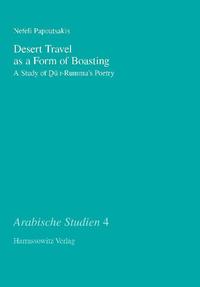
Boasting about one’s travels through the desert was a very common topic of self-praise in early Arabic poetry (ca. 500–750). Desert crossing would attest to a man’s character, providing evidence of his valour, stamina, industriousness and ambition. The book focuses on desert travel as a self-praise theme in early Arabic poetry and especially in the work of the Umayyad poet Dur-Rumma (ca. 695–735), one of the last great exponents of the Bedouin poetic tradition. It discusses the various motifs associated with desert travel in Dur-Rumma and traces their antecedents in the work of earlier poets. By analyzing the diachronic development of the travel theme and evaluating its place within the poem as a whole, it challenges the widespread view of the Arabic ode (qasida) as a tripartite composition and contributes to a better understanding of early Arabic poetics. For despite the fact that desert travel was a central theme of early poetry, it has never been studied in detail and its purport as a theme of self-praise has not been generally recognized.